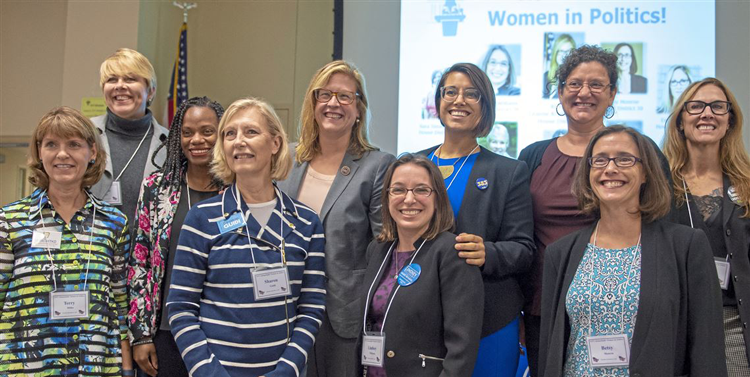
Photo Credit: Pittsburgh Post-Gazette
With a wide smile, state Rep. Leanne Krueger-Braneky exclaimed, “This is the future of the Legislature, folks,” then posed for a photo with nine women running for office in Western Pennsylvania.
Call it a sign of changing times, for it was just three years ago that Ms. Krueger-Braneky, a Democrat from Delaware County, arrived for her first day on the House floor in Harrisburg and noticed there weren’t many women around her.
Now, they’re poised to enter the Pennsylvania Legislature in serious numbers.
In races for 203 state House seats Nov. 6, 31 women likely will prevail — either facing no challenger or another woman — and an additional 62 are running against men, according to a Post-Gazette review of electoral match-ups from Ballotpedia.
That’s more women on the ballot than at any other time in state history, Ms. Krueger-Braneky said, a factor that could signal significant increases in female representation. Only 42 House seats — or about a fifth of the chamber — are currently held by women.
“Women work hard, they care about their constituents and they’re in this because they care about issues, not ego,” Ms. Krueger-Braneky said at an invitation-only event Thursday celebrating women candidates at the Pittsburgh Federation of Teachers’ headquarters on the South Side, “And they’re more effective legislators when we get them to Harrisburg,”
A similar wave could hit the state Senate, where currently women hold seven of the 50 seats. After November, in which 25 seats are on the ballot, six more women likely will join two others whose seats aren’t up for election, for a grand total of eight seats. Another 10 are vying for seats against men.
Democrat Sara Innamorato of Upper Lawrenceville, who is on a fast track to Harrisburg with no Republican challenger in the general election for the 21st state House district, said electing more women would mean more optimism and an “ability to listen and collaborate more.”
“I’m only one vote, so I need people who are on my side and share this vision and share the values that I have,” said Ms. Innamorato, who upset Democratic incumbent Dom Costa in the primary for the 21st, which extends from Aspinwall through parts of Ross.
Lindsey Williams of West View, a Democrat running for the 38th Senatorial District against Republican Jeremy Shaffer, said she has coordinated canvasses with the female state House candidates in the area, including Ms. Innamorato. The women are a team, Ms. Innamorato said, and they share everything from resources to words of encouragement.
Their teamwork was on display at the event, where candidates encouraged attendees to give money to other candidates with an eye for the future.
“Donate to these other women,” said Summer Lee of Swissvale, who faces no general election challenger for the 34th House District after beating incumbent Democrat Paul Costa in the primary. “Please plant seeds for 2019, for 2020, for what we want our city and state to look like. We control that today. We don’t have to wait for anybody else to come in.”
Studies show that Pennsylvania has suffered from a lack of female representation in the Legislature. A May 2017 report from Chatham University’s Center for Women and Politics hypothesized that because there were so few women, there was “evidence of persistent gender inequality and policies that negatively impact women’s ability to be engaged in the workplace, provide childcare for their children, manage their health and reproductive rights, and participate in the legislative process.”
Democrat Amy Fazio, running against incumbent Republican Jim Marshall of Beaver County in the 14th State House District, said she believes women have a strong record of collaboration — a skill set that doesn’t happen by accident.
“The women I work with, we can focus on really the shared values of what we want to get done and less dog fighting about how we get there,” Ms. Fazio said.
Pennsylvania’s congressional delegation could change, too. For the second time in history, eight female nominees are fighting for U.S. House seats in the general election in Pennsylvania. It’s been more than 1,300 days since Pennsylvania had a woman member of the House — Allyson Schwartz finished her fifth term in January 2015.
At least one woman will enter the congressional delegation, as Democrat Mary Gay Scanlon faces Republican Pearl Kim in the 5th District in north central Pennsylvania. Three more districts — the 4th, 6th and 7th — are leaning toward the female candidates, according to ratings by the nonpartisan Cook Political Report.
These trends have echoed nationwide, driven in part by opposition to President Donald Trump and inspired by women’s empowerment movements like #MeToo — which stands against sexual violence in the workplace.
According to the Eagleton Institute of Politics’ Center for American Women and Politics at Rutgers University, a record number of women are nominees in state legislative races, U.S. House races, U.S. Senate races and gubernatorial races across nationwide.